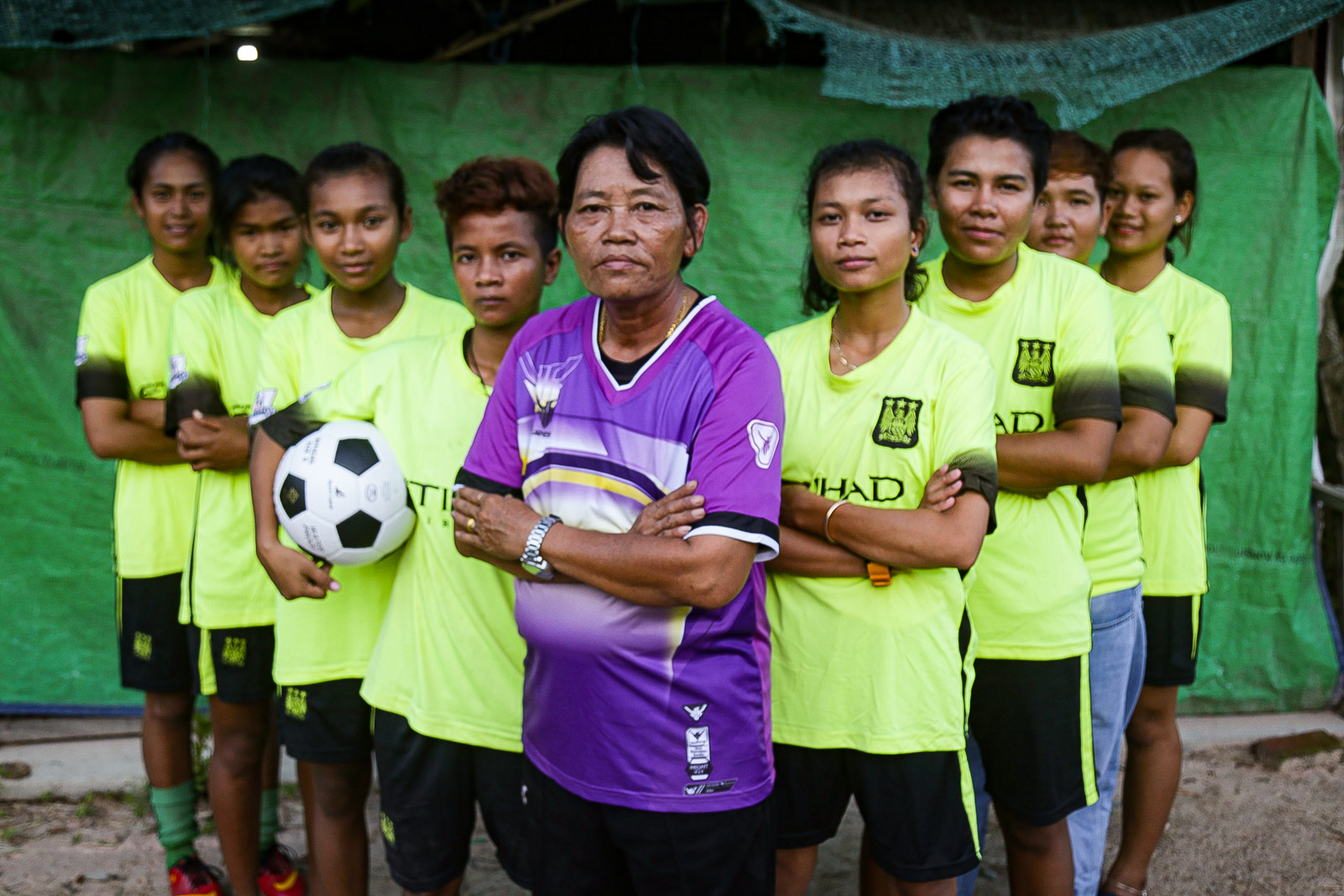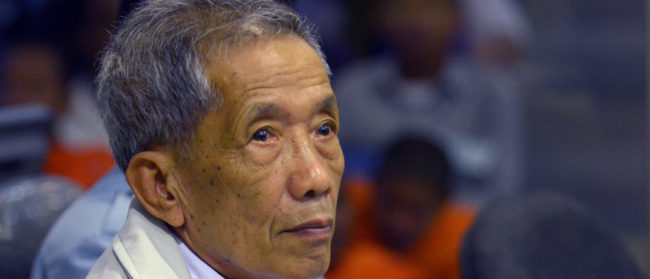In rural Kampong Chhnang, 61-year-old Van Sovan watches as his squad are put through the paces in the midday Cambodian heat. Touch, pass, pass, shoot – practice makes perfect.
Sovan, the team’s founder and head coach, is wearing a newly gifted cap, embroidered with the emblems of the famed South Sydney Rabbitohs and west London’s Fulham Football Club. In the 2009 football season, Fulham made it to the inaugural UEFA Europa League final. They lost, but it proved a significant year and milestone in the history of the club.
10,000km away, in Cambodia’s Kampong Chhnang province, a more significant milestone was being reached during that same season. Sovan’s team, the Kampong Chhnang Women’s Under-21s, was established, by the then-teacher and administrator at the local Youth and Sport department.
Born biologically a woman, Sovan goes by the pronoun of ‘he/him’, but refers to himself as a lesbian. Affectionately called ‘Daddy Sovan’ by his players, he set out to create a team built around girls of any sexual orientation and identification.
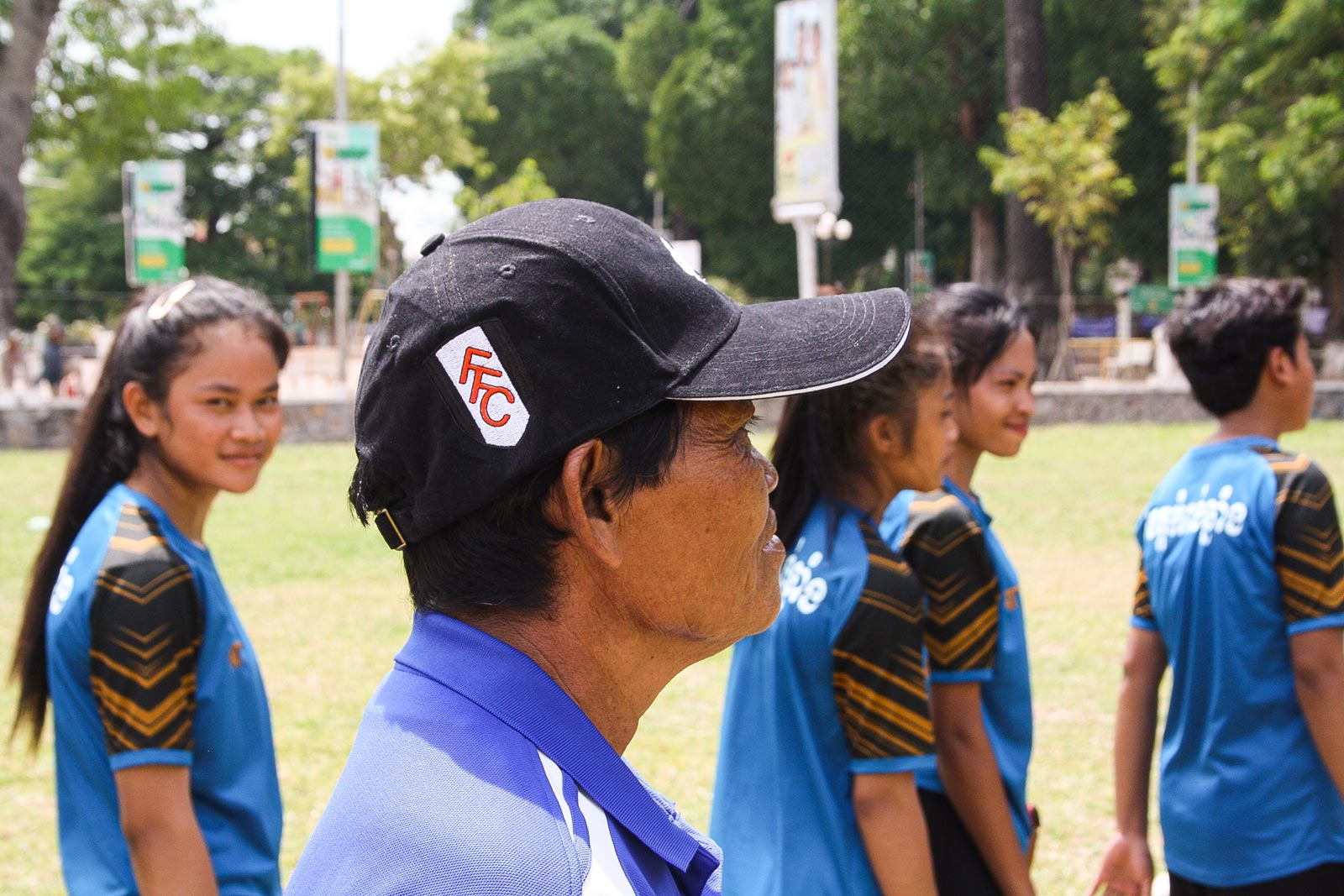
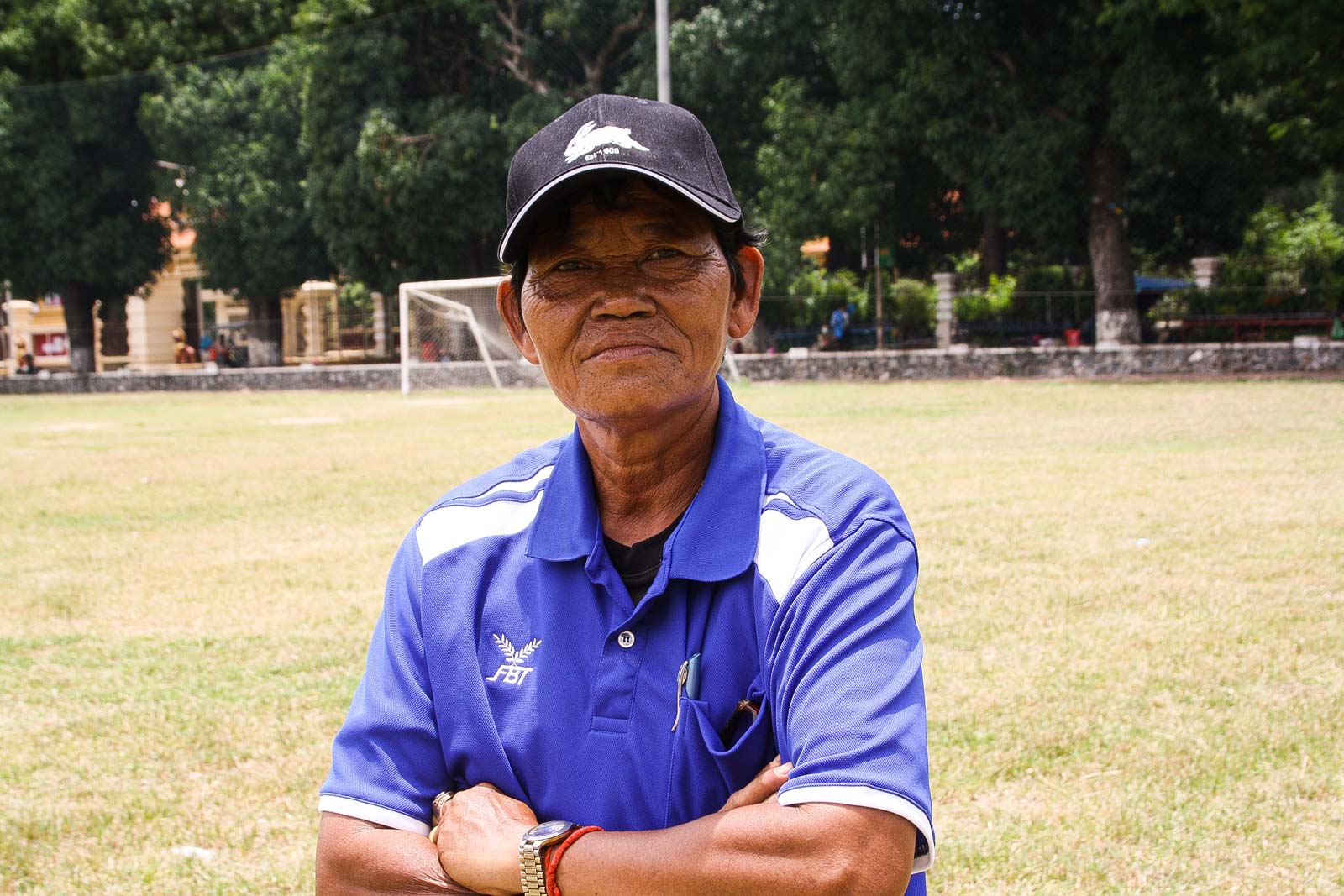
The motivation was to establish a team that had a mix of sexual orientations
The team over the years has been composed of girls of all identities – straight, lesbian and transgender. The team has been fighting on two fronts – to ensure success on the football pitch and to change perceptions off it. In both cases, the team has been triumphant.
“Since I was very young, I loved to play football,” Sovan told the Globe after the morning’s training session on the parched grass pitch in rural Cambodia. Sovan is a well-known figure around the Kampong Chhnang province, with a documentary about the club and its unique story by filmmakers Vanna Hem, Tommaso Colognese and Robert Witlox also in the works.
“The motivation was to establish a team that had a mix of sexual orientations,” said Sovan. “Lesbians at the time faced a lot of discrimination. So, my idea was to create a team where girls of any orientation could come together and play football.”
The documentary will follow the story of Sovan and two trans-identifying athletes, once members of the squad, chronicling their journeys through sport and life. One of the filmmakers, Vanna, told the Globe that the club has “a completely unique story – one that we thought needed to be told to a wide audience”.
The project dates back to 2015, when the filmmakers first conceptualised the documentary. Filming was shot over different trips to the province and the club, and after a successful kickstarter campaign last year, editing began. The ongoing Covid-19 pandemic has put a pause on the project, however, but the trio aim to release their film next year.
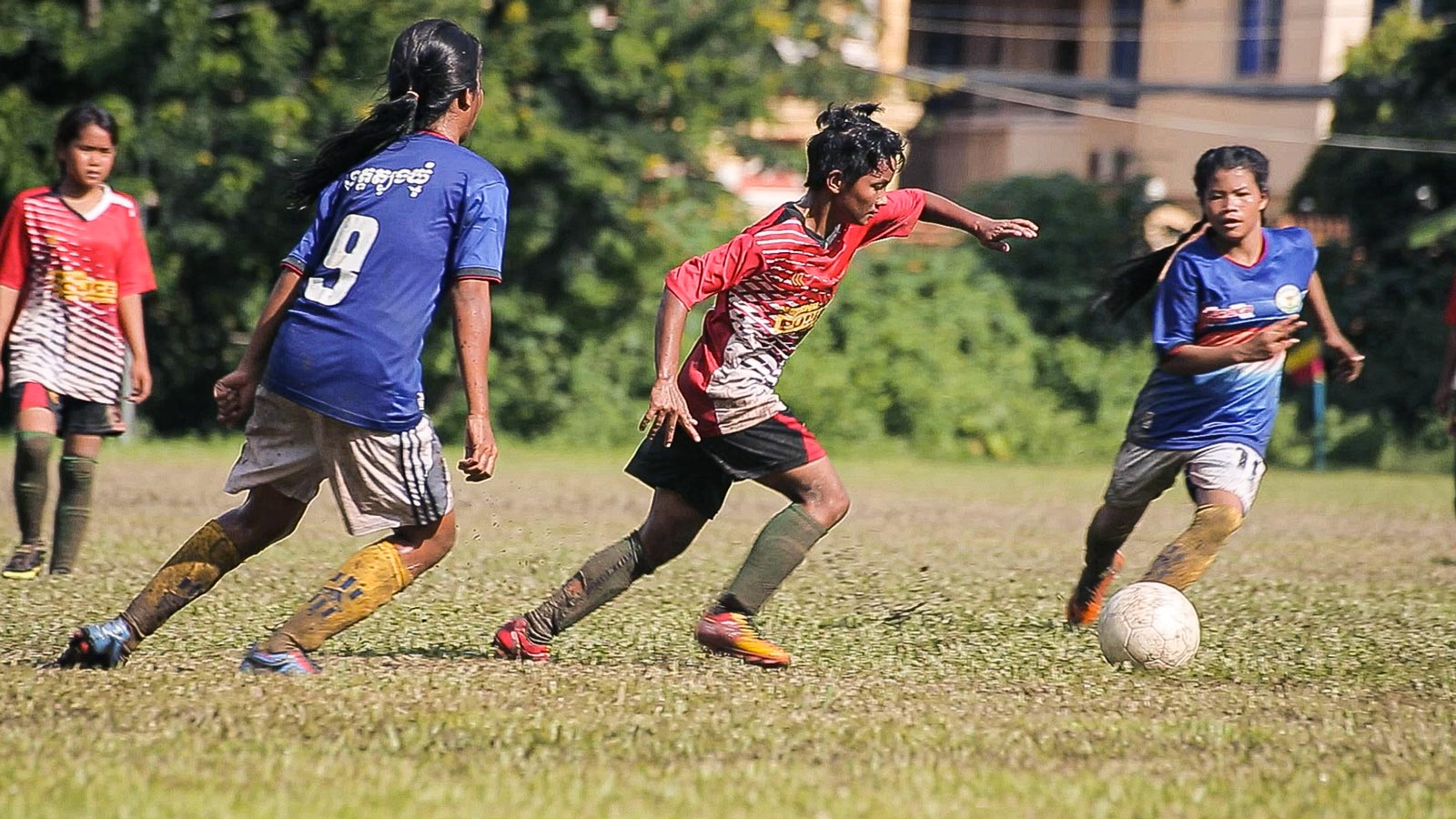
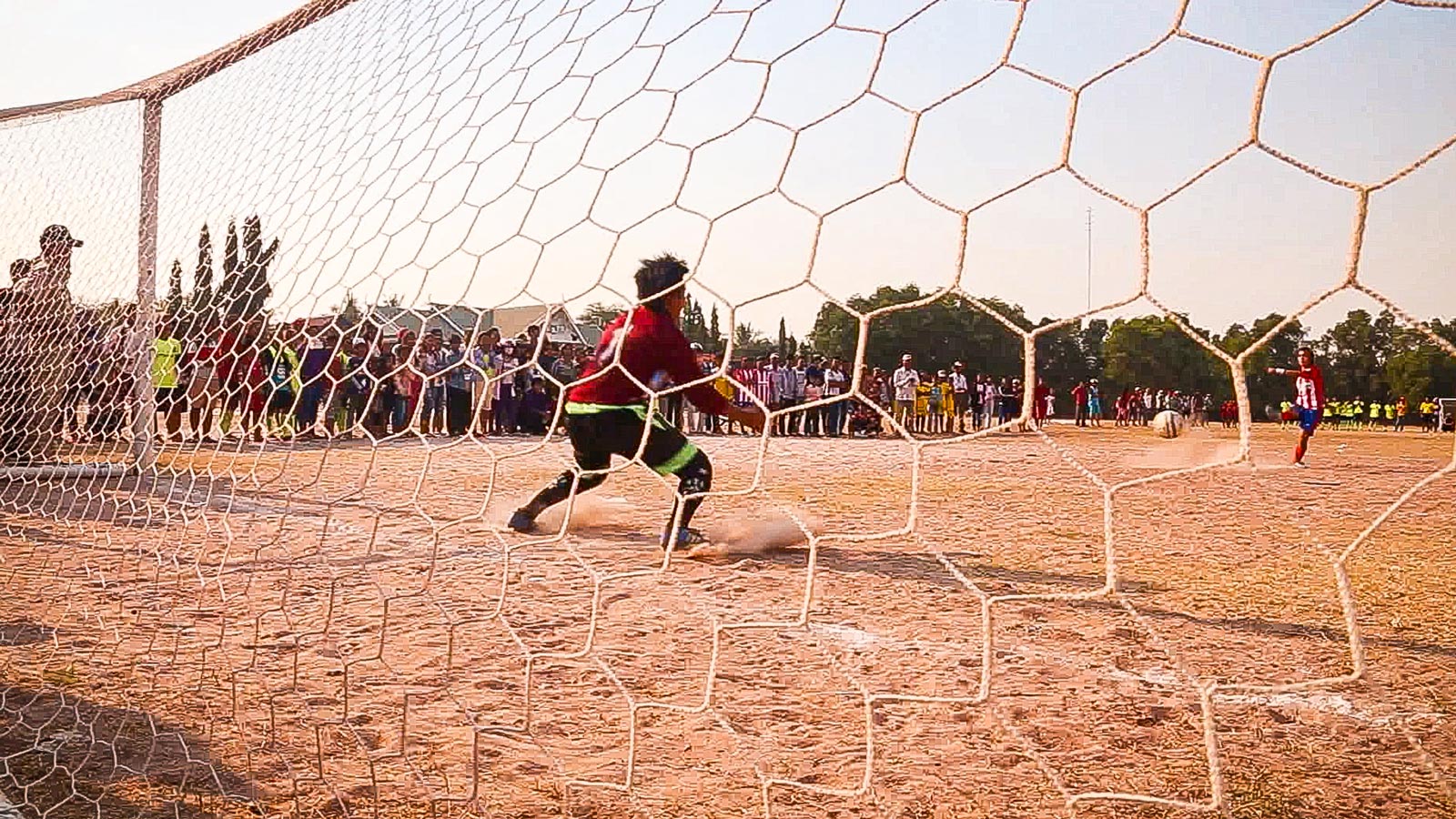
The terminology surrounding the gay, lesbian and transgender community takes on its own character in the Cambodian context. As a result, the concept of ‘homosexuality’ as understood in the West, is not always directly applicable.
The focus is on character traits and outwardly visible characteristics instead of sexual orientation, so that the act of cutting one’s hair short signifies that someone is a lesbian. Some of the players refer to themselves as lesbians, but also use the pronouns he/him – blurring categories used elsewhere in the world.
In Cambodia, homosexuality is not illegal and the LGBT community experience some level of acceptance in wider society. In 2018, Destination Justice and UN report Revealing the Rainbow said the Kingdom’s LGBT community experience “relative visibility, with a wide range of LGBTIQ events taking place”. UN Development Programme Representative and Resident Coordinator for Cambodia, Claire Van der Vaeren, also noted that Cambodia’s LGBT community is becoming “more vocal and organised”.
However, LGBT people still face inequity and a lack of protection, with Cambodia’s legal system failing to “offer positive legal protection for LGBTIQ people”. No prohibitions against discrimination on the basis of sexual orientation or gender identity currently exist in the Kingdom, while same-sex marriage remains unrecognised legally. Consequently, prejudice and sometimes even abuse, from family members, employers and police leaves victims with little recourse.
The views of the Kingdom’s political elite towards the LGBT community have also been mixed. In 2004, then-King Norodom Sihanouk made a statement in support of same-sex marriage, while Princess Norodom Soma published a 2012 editorial in the Phnom Penh Post titled, Being Gay is Not Wrong.
However, officials consistently deny the existence of LGBT discrimination, ruling out the need for special protections to be put in place. And in 2007, Prime Minister Hun Sen disowned his adopted daughter for being a lesbian. “My adopted daughter now has a wife – I’m quite disappointed,” he said of his then-19-year-old daughter, adopted in 1988. “I will ask the court to disown her from the family.”
For Sovan’s club, acceptance – often lacking in society – is part of the club’s DNA.
The make-up of the team is an even split between heterosexual and lesbian players. And no good team, however strong the pool of talent, can be successful without solidarity between teammates.
Chhun Theavy, a lesbian, going by the pronoun him/he, is one of the members of the squad. The 19-year-old, who can play in positions across the pitch, says that Neymar – Paris Saint Germain’s temperamental Brazilian maestro – is his favourite footballer. While originally from Battambang province, he said he has found a team where he feels at home in Kampong Chhnang.
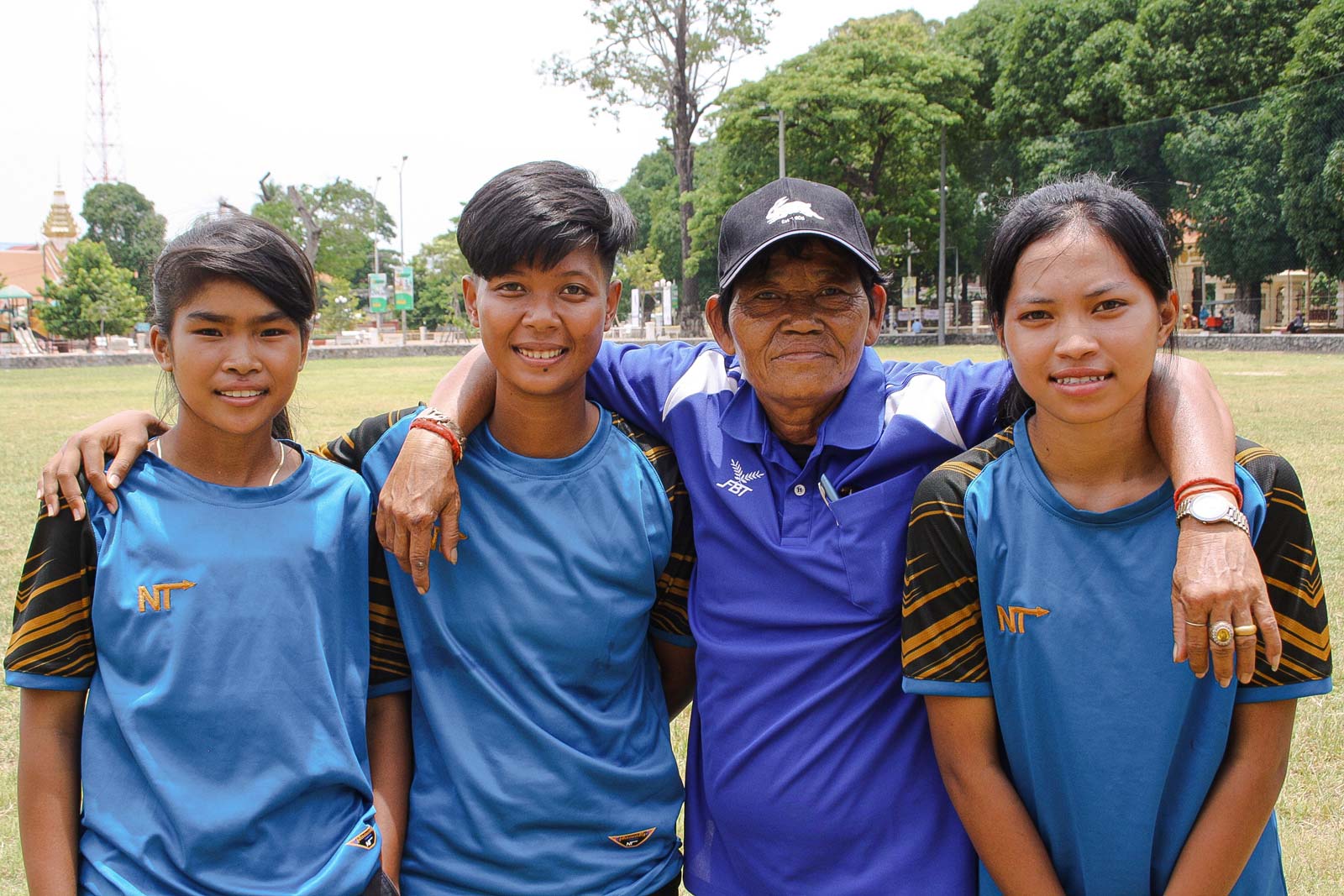
“This is a unique club and I feel really comfortable here,” said Theavy. “Whenever we start to play, we are always in unison with one another.”
Chea Sokly, 16, is a recent recruit to the team – this being her first season with the club. She said that she is unsure yet of her sexuality, but is happy to be part of a team where she has felt welcomed. “Even though this is my first year at the club, I’ve felt really comfortable and happy to be here,” she said. “The whole team is really nice and accepting.”
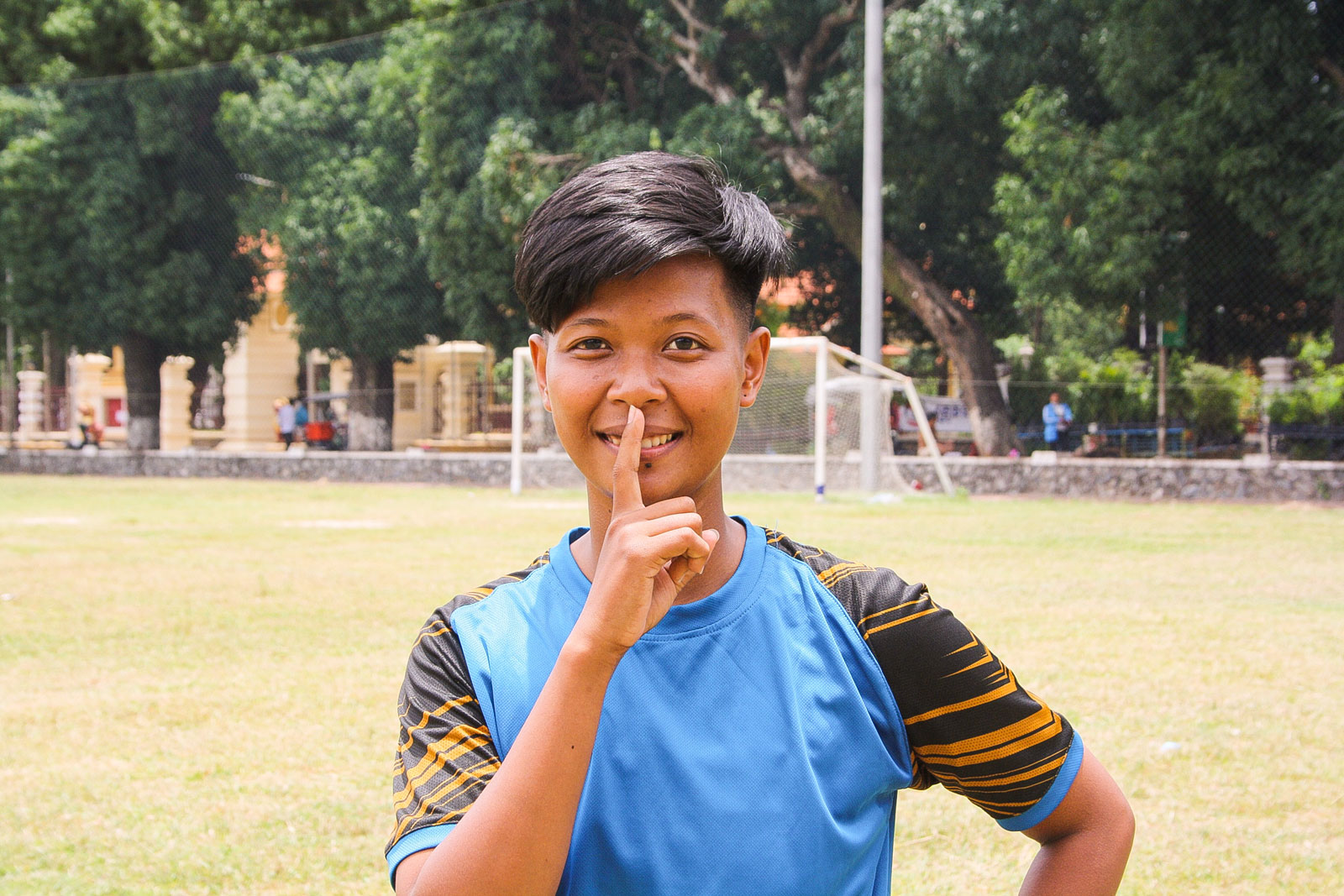
Some people and opponents have asked me, ‘why do you cut your hair like that, like a boy? … When they ask, I say to them – ‘this is the way I am’
Voeun Sothan, or ‘Seyla’, 19, is by all accounts the team’s best player – having toured with a local football team in Japan in 2018 for a few months, after being spotted and scouted in Cambodia. She echoed the sentiments of Theavy and Sokly, the club is more than just a football team.
“Not just on the pitch but also off it, they support me – with my studies, for example,” she said.
Solidarity in difference, acceptance of diversity and the promotion of one’s self are all important components of the club and what makes it unique. “I try and teach the girls so they can play and come together,” said Sovan. “Football is one of my biggest passions, so I had a strong commitment that the team we built – had to be built for everyone.”
At first, however, the team was not always met with fanfare. “Against other teams, there were some reactions from opponents – they would often question why we had created this team,” explained Sovan. “We would face comments and discrimination, but I would try to explain the nature of our players and our team – let them be, let them just play.”
Sovan now says that the amount of comments, insults and discrimination, has reduced significantly – almost to the point of non-existence. He said that, renowned for being often among the strongest players, rival teams are courting lesbian players, rather than shunning them. “You can look around now and see a lot of lesbian players in other teams – you can see the acceptance and diversity,” said Sovan.
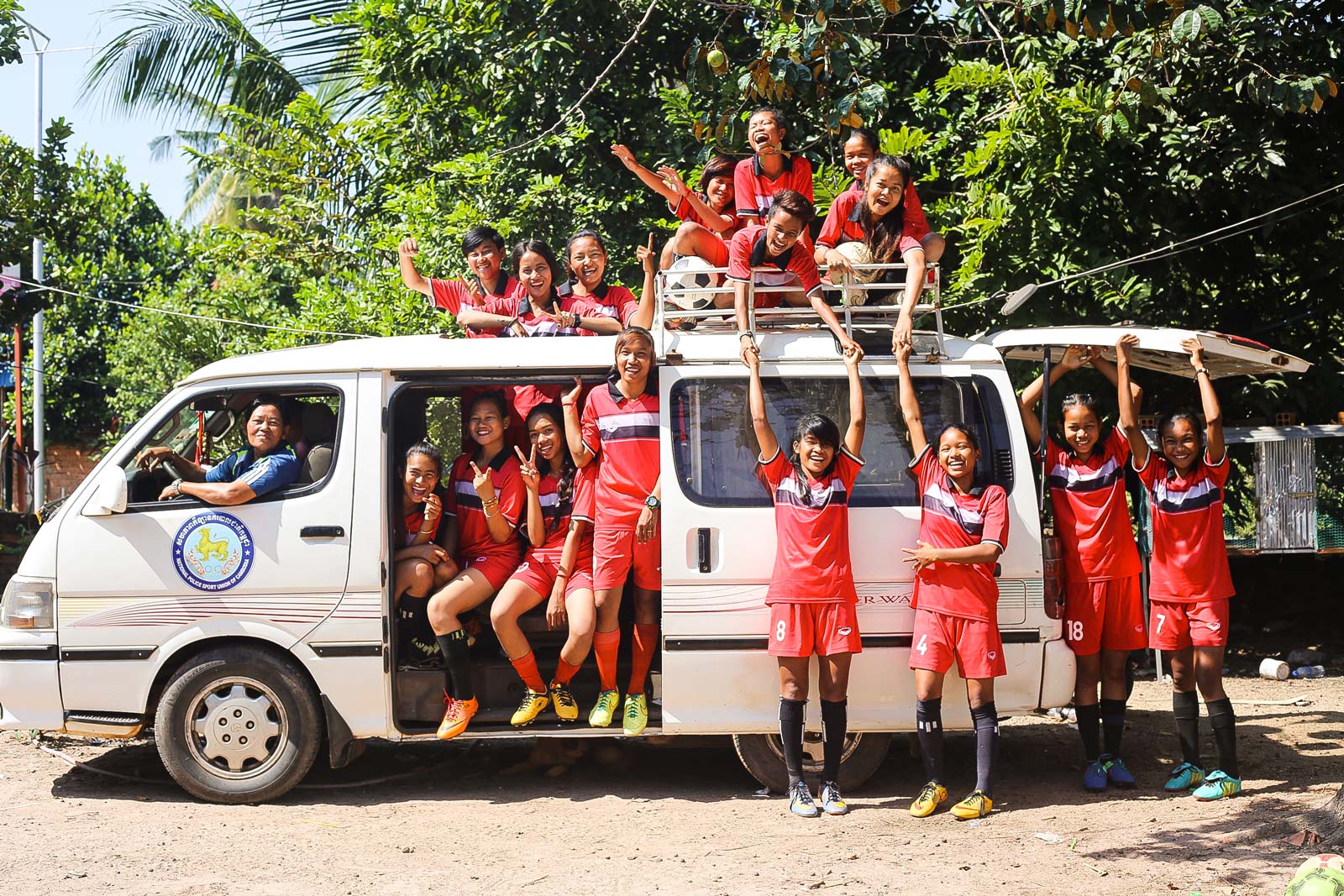
Seyla, who has been with the team for seven years, said that she suffered discrimination and insults in the past for her sexual orientation, but that has now waned. Theavy – who has short, cropped hair – said that he has been fortunate over the years and hasn’t faced harsh discrimination, but has been often asked why he chooses to look the way he does and be referred to as a boy.
“Some people and opponents have asked me, ‘why do you cut your hair like that, like a boy?’” Theavy said. “When they ask, I say to them – ‘this is the way I am.’”
The team is still a youth team, so parental consent is necessary. Sovan said that some parents are accepting of their daughter’s decision, some played under Sovan before and pushed their daughter to join also. Others take a bit more time to accept their daughter and the team, but come around, eventually.
The player-coach relationship with the squad and Sovan is also central to the team’s longevity and success – both in a sporting sense, as well as a holistic one. “The relationship between the players and myself is extremely close,” said Sovan. “Sometimes I scold and shout, but they know what I want from them.”
This can be seen not just on the pitch, but off it, too. Theavy explained that Sovan encouraged him to return to his studies and finish his exams, after dropping out. “Sovan I really respect and appreciate – he is someone I look up to as a mentor,” he said.
Soklay hails from the Pursat province, and sought out the team, such was her desire to play with them. “The reason why I wanted to come and play for this team is that I really trusted Sovan,” she said. “He pays a lot of attention to the players and looks after us.”
The team is not just a token of diversity, they’re competitive too.
The team practices regularly, in full training kit, with two coaches alongside. They play youth and women’s teams from across the province and Kingdom. Sovan said that such is the strength of his team, some results against less well established clubs can turn into cricket scores. They have even played the women’s team of the famous, professional Phnom Penh Crown Football Club.
Since 2009, the club has collected six trophies, 25 medals, five bronze placings and one golden boot. They have competed at the prestigious National Games twice, in 2016 and 2018. “The trophy – winning – is always our number one goal,” said Sovan. “When they step onto the pitch, their mentality is one of winning – they are a team full of winners.”
Embroidered, too, on the final side of Sovan’s gifted cap is the colloquial name of the Rabbitohs – the Oldest, Proudest, Loudest.
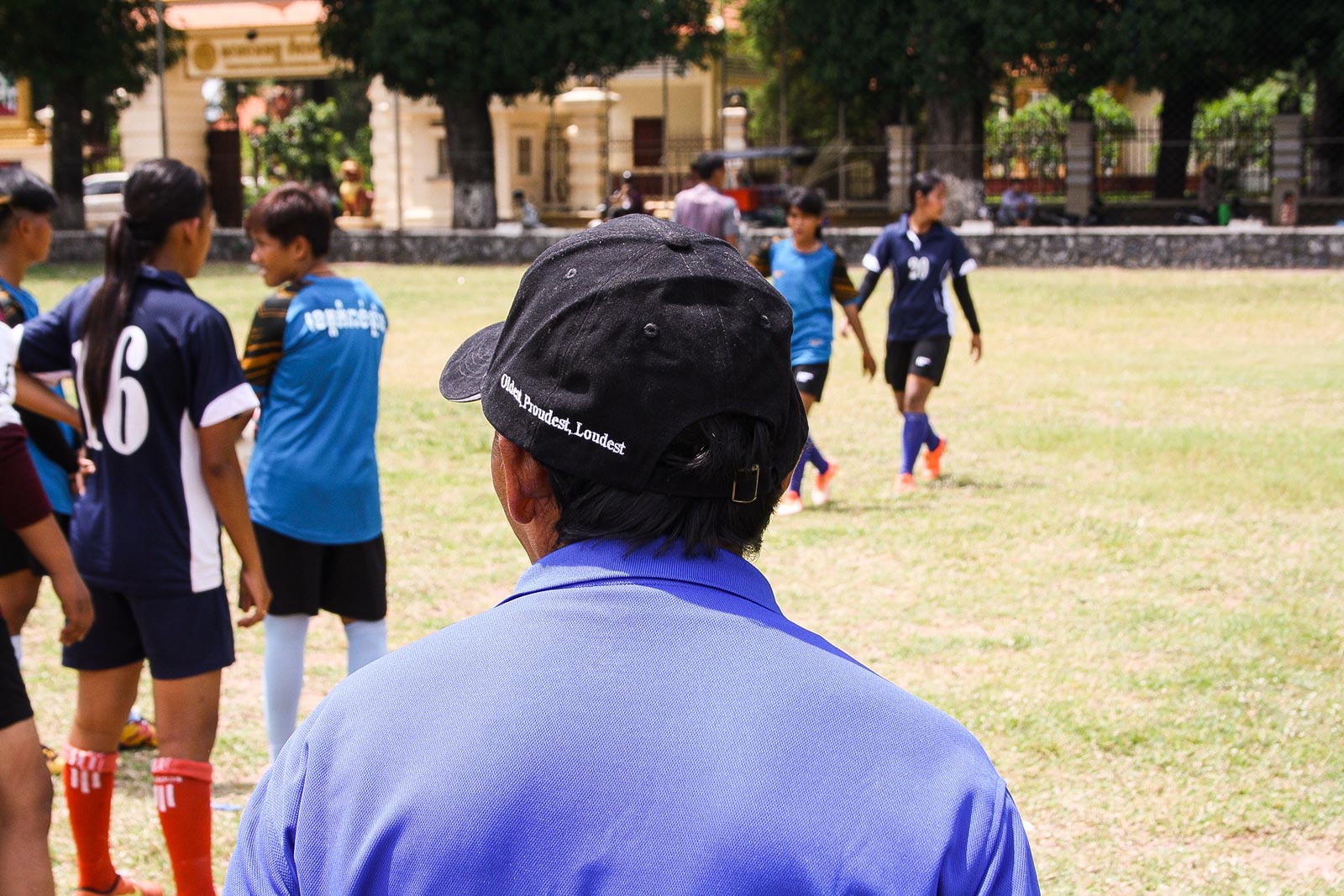
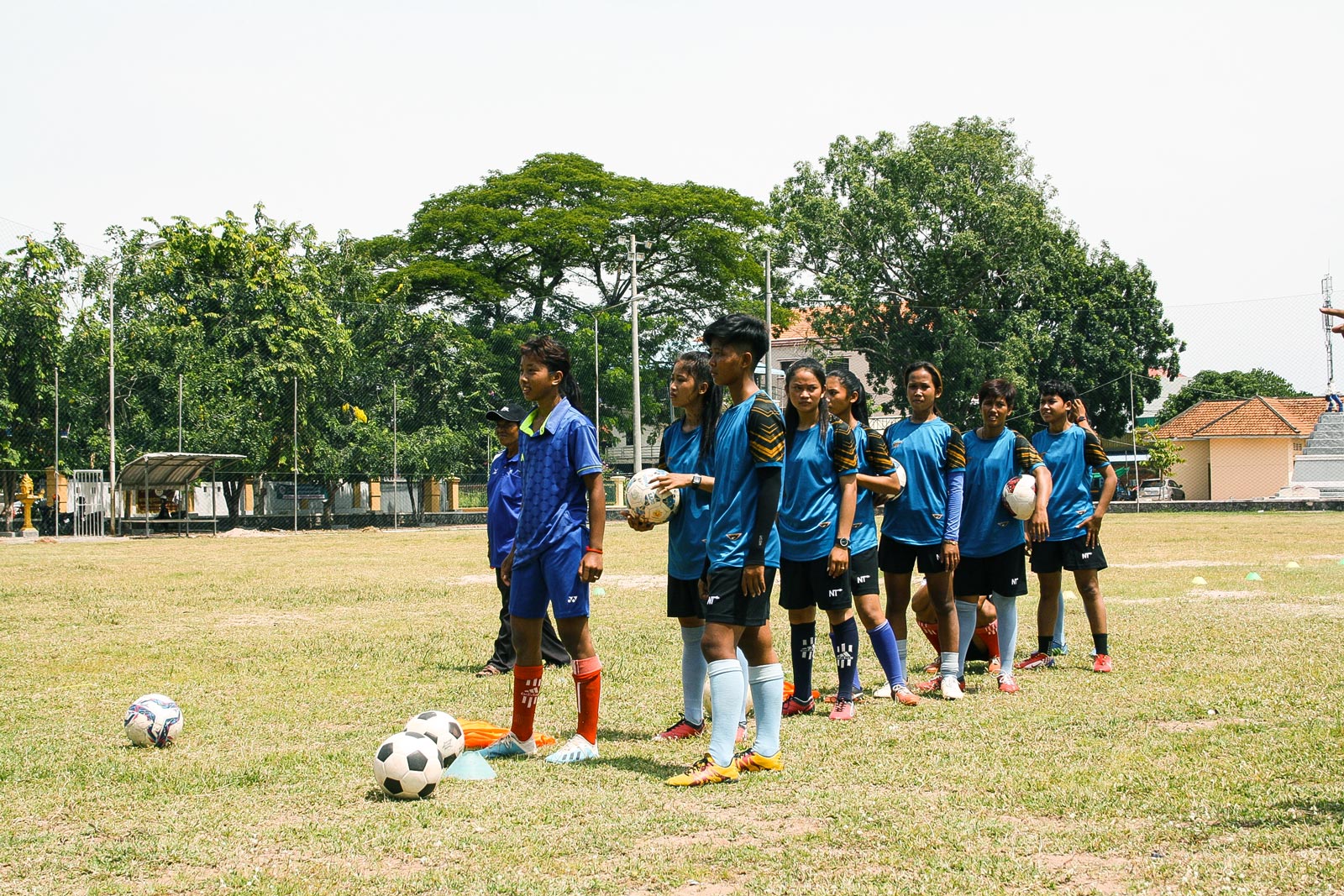
That creed can too be applied to Sovan’s team. The oldest club to accept and celebrate players of all sexual identities, the proudest for their inclusive ethos, and the loudest in celebrating diversity.
The team will continue to train, play and grow – Sovan will be in charge of it, as long as he physically can, he said.
Off the pitch, the significance of the club for local lesbian players, and the wider community as a whole, should not be underestimated. And for Sovan and everyone involved with the club, two words are synonymous with its ethos – diversity and acceptance.
“We are all equal – what a straight person can do, a gay person can also do,” said Sovan. “No two people are the same, but we should encourage those that are different – not discriminate.”
With a history of sustained footballing success and acceptance of diversity, that ethos of Kampong Chhnang Women’s Under-21 Team is a rallying cry that Sovan hopes can be seen, heard and practiced across the province and the Kingdom.
“Should we close our eyes to discrimination when we see it? No, we should open our eyes and help raise those people up,” said Sovan. “People need to understand – whatever our sexual differences, we are all the same. We are all human beings that should come together to help one another and live in harmony and peace.”
Lotus Sports Club, the upcoming documentary about the Kampong Chhnang Women’s Under-21 Team, is set to be released in 2021. It chronicles the journey of the club’s players both on and off the football pitch. Find out more about the project here.
